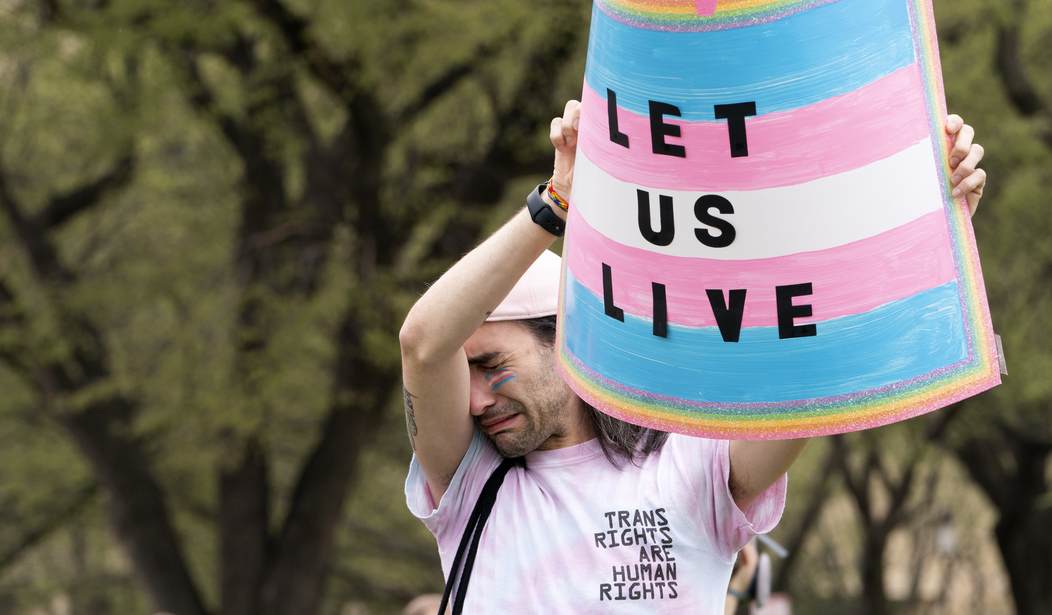For some time now, discussions, debates, protests, and other assorted behaviors involving transgenderism have frequently dominated the social landscape. Governments, suburban elites, educators, activists, and drag queens have embraced it. And woe be to anyone who suggested that the movement may have attracted status seekers or people with agendas who have taken advantage of people who struggle emotionally or vulnerable children, or who have opined that the whole thing may be a social trend, or a childhood phase, albeit one with permanent consequences for many.
The mere utterance of any phrase, opinion, or thought that was not in complete solidarity with the transgender movement, including the idea that children are too young to make such monumental decisions about altering their bodies and their bodies' chemistry, faced accusations of transphobia and attempted genocide. And in some instances, critics of the transgender movement were lucky if all they received were accusations.
Be that as it may, earlier in the week, the UK released the Cass Review, and the findings are not what the transgender advocates were hoping for. Dr. Hilary Cass is a British pediatrician. She spent over four years compiling data on children who transitioned. The review is almost 400 pages, and you can access it here.
The website states that the UK's National Health Service commissioned the review to “make recommendations on how to improve NHS gender identity services, and ensure that children and young people who are questioning their gender identity or experiencing gender dysphoria receive a high standard of care, that meets their needs, is safe, holistic and effective.”
Some of Cass's findings include:
- There is no simple explanation for the increase in the numbers of predominantly young people and young adults who have a trans or gender-diverse identity, but there is broad agreement that it is a result of a complex interplay between biological, psychological, and social factors. This balance of factors will be different in each individual.
- The rationale for early puberty suppression remains unclear, with weak evidence regarding the impact on gender dysphoria, mental or psychosocial health. The effect on cognitive and psychosexual development remains unknown.
- The use of masculinising / feminising hormones in those under the age of 18 also presents many unknowns, despite their longstanding use in the adult transgender population. The lack of long-term follow-up data on those commencing treatment at an earlier age means we have inadequate information about the range of outcomes for this group.
- Clinicians are unable to determine with any certainty which children and young people will go on to have an enduring trans identity.
- For most young people, a medical pathway will not be the best way to manage their gender-related distress. For those young people for whom a medical pathway is clinically indicated, it is not enough to provide this without also addressing wider mental health and/or psychosocially challenging problems.
Writing at The Free Press, Lisa Selin Davis did a deep dive into the report. The review also shows that “Thousands of vulnerable young people were given life-altering treatments with ‘no good evidence on the long-term outcomes of interventions to manage gender-related distress.’” Cass also found that hormone treatments did not reduce the risk of suicide and that social justice ideology was the driving factor in medical decision-making, with many doctors keeping their concerns to themselves because of the nature of the debate.
Davis also found the following in the review:
- A disproportionate number of patients were “birth registered females presenting in adolescence. . . . a different cohort from that looked at by earlier studies.”
- Many parents feared their children had been medicalized by professionals who didn’t take other difficulties into account, “such as loss of a parent, traumatic illness, diagnosis of neurodiversity, and isolation or bullying in school.”
- There is a lack of strong evidence to show that puberty blockers “may improve gender dysphoria or overall mental health.”
- The majority of gender-dysphoric patients in early studies found that their symptoms desisted during puberty, with most coming out as gay or bisexual later.
These are all concerns that critics have raised for years. Each time, the usual accusations, acrimony, and hostility follow.
Reporting on the Cass Review, one British TV presenter made it clear that she was through with the language games while interviewing a "very special" non-binary trans person:
EPIC. LGBTQ activist gets super triggered after being “misgendered.”
— Libs of TikTok (@libsoftiktok) April 10, 2024
"I'm a very special, non-binary, trans person. You chose to use the incorrect pronouns for me.”
Host @JuliaHB1: "Is it disrespectful for me to use correct, factual grammar?"pic.twitter.com/3fUqH8BfWU
That may be good for a small chuckle. But one of the many tragedies that will come out of this episode in history is that even as the evidence continues to mount that transitioners are not nearly as numerous as some would have us believe and that the surgeries, hormone treatments, and puberty blockers have caused damage that can never be repaired, little will likely change.
One of the traits of the Left is that it never admits when it is wrong. There will be no apologies or admissions of guilt. Anyone who wants compensation for their struggles will likely have to endure years of litigation on top of years of painful surgery that will, in all likelihood, not restore them to normalcy. And the people who led them to where they are will have abandoned them.










